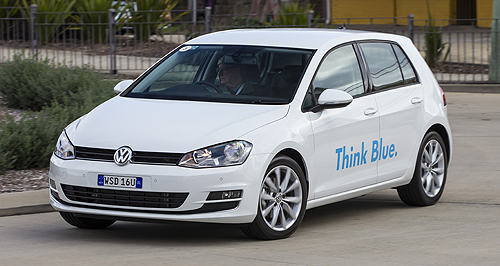Make / Model Search
News - VolkswagenVolkswagen’s race for fuel savingsTrue blue: Volkswagen chose an Up, Golf, a Passat and Caddy for its Think Blue Eco Challenge in Sydney this week. VW challenge shows the best fuel economy comes from behind the wheelGallery Click to see larger images 19 Jun 2013 EVER wondered if you drive more frugally than a professional rally driver? You probably don’t, Volkswagen’s latest fuel economy challenge suggests. Volkswagen uses the event to promote its range of vehicles using BlueMotion technologies that help to save fuel. On this occasion we would be driving an Up light car, Passat diesel wagon, Golf turbo-petrol hatchback and a diesel-engined Caddy light commercial van. The aim of VW’s game is to drive the vehicles on a designated loop. Rather than testing the performance limits of the vehicle, the winner is the driver that records the lowest overall fuel use figures. Unusually, too, former Australian Rally Championship driver Ed Ordynski would provide us with some much-needed eco-driving guidance. Not only that, but the fuel figures from each competitor would be compared with each vehicle’s official combined fuel use, as well as a tough set of benchmarks set by Mr Ordynski. It may not sound like much of a challenge, but convincing a bunch of motoring writers to drive cautiously in a bid to save fuel is a bigger ask than you might think. After years of driving to save fuel under rally conditions, Mr Ordynski was more than willing to impart his knowledge. His advice? Drive in the highest gear possible, minimise the use of heating, air-conditioning and any other accessory else that saps the battery, and avoid unnecessary weight. Mr Ordynski says we can also take advantage of the automatic gearbox’s coasting modes, and if the vehicle has a manual gearbox, drop it into neutral as you sail down an incline. Surprisingly, he also says drivers can save more fuel by leaving the manual cars in gear while coming to a complete stop on an incline. With each journalist keeping a careful eye on each other, we took the wheel for the first loop. I had the added pressure of knowing another GoAuto journalist had taken first place in last year’s challenge. Our first ride was the Passat wagon, fitted with a 2.0-litre diesel engine producing 130kW of power and 380Nm of torque, and mated to a six-speed dual-clutch automatic transmission. BlueMotion technologies fitted to the Passat include a coasting function, an idle-stop system, brake energy recuperation that converts some of the energy lost when braking and coasting into electricity, and a shift-point indicator that suggests the most appropriate time for gear changes when the auto is in manual mode. Our 30-minute test loop through Sydney’s eastern beaches took in shopping strips and 40km/h school zones, three-lane highways and regular suburban backstreets. The Passat proved itself to be a quiet, smooth and capable family tourer, but despite all the BlueMotion technology, we failed match Mr Ordynski’s 5.1 litres per 100 kilometres. Likewise, our 6.0L/100km figure could not match the Passat’s official 5.4L/100km average. Not to worry, surely we can make up some ground in the Caddy?The Caddy Maxi TDI250 is powered by a 1.6-litre diesel making 75kW and 250Nm, and features the brake energy recuperation and idle-stop systems. Unlike the Passat, it uses a six-speed manual gearbox. Despite our best efforts to drive ultra-conservatively and coast along in neutral, we recorded a fuel use average of 6.7L/100km – our worst of all the cars, far higher than Mr Ordynski’s 5.3L/100km, and even Volkswagen’s official figure of 5.2L/100km. Thankfully, we didn’t completely embarrass ourselves in Volkswagen’s smallest car, the tiny 55kW/95Nm three-cylinder, 1.0-litre Up city hatchback. The only BlueMotion technology the Up features is a shift-point indicator to show the optimal point to change gears. Ensuring a low score will mean sticking to high gears, coasting in neutral and very low speeds. Our 4.5L/100km bettered Volkswagen’s official figure of 4.9L/100km, but couldn’t match Ed’s frugal 4.0L/100km effort. Volkswagen’s latest arrival, the all-new Golf Mk7, was a last chance to redeem ourselves. We drove the 103TSI turbo petrol Highline fitted with Volkswagen’s 1.4-litre TSI engine and mated to a seven-speed dual-clutch transmission that was fitted with stop/start, brake energy recuperation and the gear shift recommendation. We didn’t have to do much to get the most out of the Golf, occasionally engaging the gearbox’s manual mode and coasting where possible, and using the engine’s idle-stop system. Our Golf achieved a figure of 5.7L/100km. While it was higher than Volkswagen’s official 5.2L/100km combined fuel use figure, and Ed’s 5.0L/100km result, the result was good enough to make us the third-most frugal motoring writers. Although the Golf gave us a slight boost, nothing could prevent us from ending up on the bottom of the leader-board, beaten by four colleagues from other publications. GoAuto’s average fuel use across the combined four vehicles was 5.7L/100km, which is not a bad result. However, considering the winner averaged 4.4L/100km and the runner-up 4.8L/100km, we left Sydney feeling somewhat deflated. While Volkswagen’s Think Blue challenge showcased the car-maker’s fuel-saving technologies, it did not paint a realistic picture of what everyday drivers could achieve under normal conditions. Had we taken the same vehicles on different routes and driven them like any other car, the results would have been very different. But where is the fun in that?
 Read more |
Click to shareVolkswagen articlesResearch Volkswagen Motor industry news |
||||||||||||||||||||||||




























Facebook Twitter Instagram